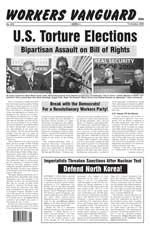
Victory to the Goodyear Strike OCTOBER 9—15,000 workers represented by the United Steelworkers (USW) struck Goodyear Tire & Rubber Co. on October 5, shutting down 12 U.S. plants in ten states and four Canadian plants. The strike is against company plans to close plants in Tyler, Texas, and Gadsden, Alabama, and to slash wages and health care benefits, even after Goodyear raked in over $200 million in profits last year and awarded top executives millions in bonuses. In 2003, the union agreed to a contract allowing the company to close a plant in Alabama and eliminate 6,000 jobs, while cutting wages, pensions and health care benefits. As one worker in Akron said, “Two billion dollars in concessions in 2003. Now they want more” (Associated Press, 6 October). The company wants to reduce wages by some 40 percent through combining job classifications, changing work rules and outsourcing maintenance. A shop steward at the Goodyear plant in Fayetteville, North Carolina, told Workers Vanguard, “Cut and gut is what they want. They have fantasies of busting the union.” Many of the plants are in areas where union jobs, or jobs of any kind, are scarce, and a strike victory will be a blow against the capitalists’ vicious union-busting. The union is planning for a long strike, and, according to Today’s Trucking online (6 October), the company has stockpiled its rubber products. Goodyear says it will supply its customers by using managers and overseas production. The strike by black, white and Latino Goodyear workers—who now include many women—must be supported by all labor. At Fayetteville, railroad workers are honoring picket lines set up on rail lines going into the plant. Militant picket lines to stop scabs, and the honoring of USW picket lines by unionized truckers and rail workers, can ensure that all production is stopped. Defense of the unions that have a foothold in the region is an important part of the fight to organize the “open shop” South, where union-busting and anti-black terror have always gone hand in hand. Goodyear operates two non-union plants, one in Oklahoma and one in Ontario. A solid strike to beat back the company could provide an impetus to organize all the non-union plants in the tire and rubber industry. The union says that Goodyear, the world’s third-largest tire manufacturer, wants to close the U.S. plants in order to build more plants overseas. Goodyear has more than 100 plants in 29 countries, pointing to the need for international labor solidarity. Goodyear has been attacking its workers and their unions from Colombia and Guatemala to Britain and Turkey, while fighting unionization drives in Thailand and Malaysia. In 1999, under the aegis of the International Federation of Chemical, Energy, Mine and General Workers’ Unions (ICEM), trade-union representatives from 16 countries met in Cleveland to form a network for Goodyear workers from around the world. The ICEM, which includes the USW, has called for elementary measures of international solidarity with the Goodyear strikers, including for “trade unions in the rubber industry—particularly at Goodyear plants in Central and South America—to monitor their inventories and production to ensure that they are not undermining the USW’s strike action.” Rubber workers internationally must fight against any attempts by Goodyear to break the USW strike by ramping up production, and all longshoremen must refuse to handle any cargo meant to undermine the strike. This year the USW campaigned in defense of the Mexican mine and steel workers union, which faced down union-busting in Lázaro Cárdenas, Mexico, winning a militant four-month strike with a plant occupation and pitched battles against the police. But the USW bureaucrats for decades have been at the forefront of the U.S. labor bureaucracy’s protectionist campaigns, forming a “Stand Up for Steel” alliance with the steel bosses to call for measures against imports. Protectionism in defense of “American” bosses against “foreign competition” pits American workers against their class brothers and sisters abroad. It is poisonous to the international working-class unity that is needed to advance the struggle against the bosses in each country, including the U.S. A particular target of the USW tops’ protectionism is the Chinese deformed workers state. At the 1999 “anti-globalization” protests in Seattle, the Steelworkers tops grotesquely dumped mock Chinese steel into Puget Sound. Anti-Communist China-bashing only serves the counterrevolutionary interests of the U.S. imperialist rulers, who want to turn China into a giant sweatshop. The United Rubber Workers, which merged with the USW in 1995, was a key component of the Congress of Industrial Organizations and waged some of the most hard-bitten strikes in the 1930s. Today, labor solidarity, and more than ever international class solidarity, is key to rebuilding industrial unions in the U.S. and reversing the bosses’ massacre of workers’ rights and living standards. Victory to the Goodyear strike!
|
|
|||||||||||||||||||||||||||||||||||||||||||||||||||||||||
